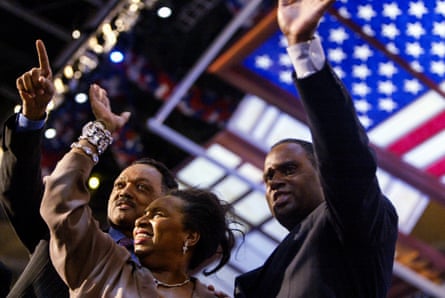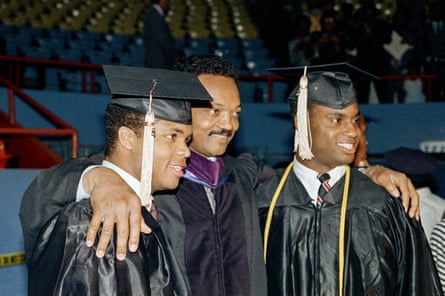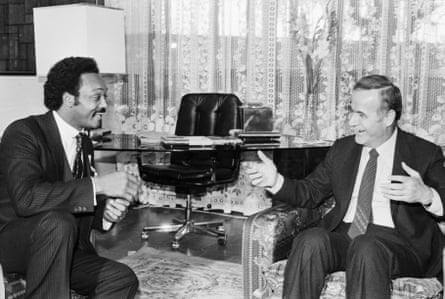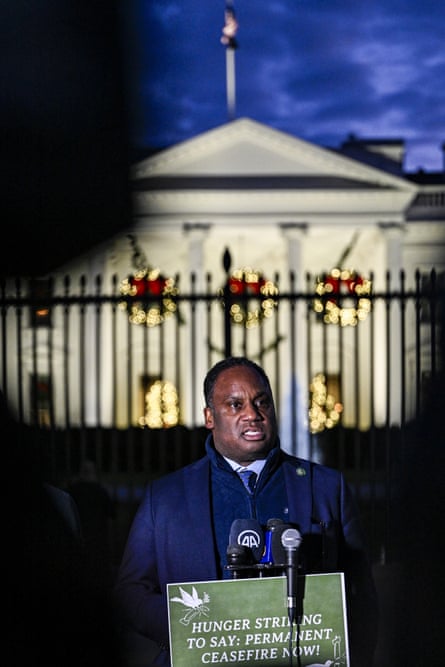Jonathan Jackson’s eyes brim with tears as he recalls the 1984 campaign of his father, Jesse, to become the United States’ first Black president. “To see my great-grandmother, who couldn’t read or write, vote,” the US congressman says, his voice faltering. “It let me see how meaningful it was to be able to vote.”
Jackson is a lifelong political activist who has come to elected office late in the game. He was a spokesperson for the Rainbow Push Coalition, an international human and civil rights organisation founded by his father. In Chicago the younger Jackson fought against the closure of public schools and worked on false-confessions cases involving the police. More recently, he co-sponsored a House resolution calling for a ceasefire in Gaza.
Next month Jackson will turn 58 and mark his first year representing Illinois’s first congressional district in the House of Representatives. He stepped up after the Democratic congressman Bobby Rush, whom he calls “Uncle Bobby”, retired after three decades representing Chicago’s South Side.
In an interview at his Washington office on Capitol Hill, Jackson – whose wife, Marilyn, leads the Muhammad Ali Center in Louisville, Kentucky – admits that it had been the last thing on his mind until he took part in a radio show and was urged to run. “My parents were 80. The family’s been through a lot. I want to make Mom and Dad proud and so I jumped in there and it was a good uplift for them,” he says.
Jackson’s parents, Jesse and Jacqueline Jackson, are veterans of the civil rights movement. Jesse witnessed Martin Luther King’s assassination in 1968, twice ran for president in the 1980s and is now living with Parkinson’s disease. (Jackson’s brother Jesse Jackson Jr served time in prison after pleading guilty to spending $750,000 in campaign money on personal items.)
Jackson continues: “I have to talk with Dad every day. He’s a junkie for this stuff. He’s in a wheelchair and not moving around as fast but his mind is super sharp as he has challenges from Parkinson’s. He knows the terrain better than anyone I can imagine.”
He describes serving in Congress as a “tremendous honour” that often yields “awe and wonderment”. But some days, he chuckles, “it feels like a bad high school that you’ve transferred into” and on others “you feel like you’re walking a tightrope over a pool of sharks without a safety net”.

Jackson is a believer in God’s grace. He and his father were arrested outside the South African embassy in DC in 1986 while protesting against racial apartheid, and then again some 35 years later outside the supreme court while protesting for voting rights.

One of six siblings, Jackson recalls the family home in Chicago always buzzing with activity and engagement with social causes. He says: “Our phone at the house would ring like a switchboard and my mother and father were both activists, if you will.
“I remember the last time we saw President Nelson Mandela of South Africa and he could barely walk any more. He heard my father was in the country and asked him to come to visit him. My father came in the room. The president was trying to stand up and he hollered out to my father: ‘Freedom fighter!’
“I would like to think that I come from the background of freedom fighters, not politicians of who’s dividing the pie, who gets what, when, where and how?”

When Jesse Jackson first ran for president in 1984, Jonathan was 18 and able to vote for the first time. He was also a campaign surrogate and witness to the backlash from a nation resistant to the idea of a Black major-party nominee. He says: “We started registering the record amount of death threats and it was just insane.
“The headlines: what does he want, can he run? Like, the audacity of being able to run? I remember one time we were in a motorcade coming down through from Washington to Virginia and they still had chain gangs out here on the highway, and to see those men stop and wave with pride, you realised it was a bigger issue.”
Jesse won four contests and 18% of the popular vote, finishing third behind Walter Mondale and Gary Hart. Four years later, when he tried again, Jonathan finished college early so he could travel the country with his father.
“I would describe that experience as sitting in the cockpit of American history, that we saw all these things happening and we saw it on the news the next day. By 88, you realised this was 20 years after the Rev Martin Luther King’s assassination and how much pride my father had in trying to move King’s dream for political empowerment, justice, economic empowerment forward,” Jackson said.

This time Jesse won 13 contests and 29% of the popular vote but still came in behind Michael Dukakis for the nomination. At the 1988 Democratic national convention, he shared a stage with Rosa Parks, whom he introduced as the “mother of the civil rights movement”. Jackson muses that he must find a photograph of that moment so he can put it up in his office.
“It wasn’t a political campaign. It was a more of a moral crusade and, from that, we’re so grateful to see President Obama win and Mrs Harris become vice-president and [Raphael] Warnock become a US senator from Georgia and that tipped the balance of power to save the democracy again.”
Jesse also channeled energy into social justice and freelance diplomacy, risking friction with US officials by inserting himself into fraught global hotspots. Jackson was at his father’s side during negotiations with Syrian president Hafez al-Assad for the release of the captured US navy lieutenant Robert Goodman, and with Fidel Castro for the release of 22 Americans held in Cuba.
“When we went to visit Saddam Hussein and they were talking about the weapons of mass destruction and the human shields, we didn’t have the portfolio of the United States government. We didn’t have a ranking member or chairmanship or United States military, went over there with just a Bible and some imams and rabbis,” Jackson says.
after newsletter promotion

“I believe in the faith community. I’ve seen it work and that’s been at the core. It’s not been politics. It’s been faith that had us travel around the world in some dangerous places with God’s grace.”
This philosophy informs Jackson’s decision to sign on as an original co-sponsor of a House resolution calling for a ceasefire in Gaza. A member of the House foreign affairs committee, he had visited Israel a month before the 7 October attack by Hamas. During a meeting with Benjamin Netanyahu, he posed a question about a reciprocal visa waiver programme but found the prime minister evasive.
“I can see that he’s a blame shifter. He will not answer the question,” he says. “He took the time to answer all the other questions but not that. I’ve never seen him seek a two-state solution in all these many years … I’ve seen him court Hamas, not wanting the PLO [Palestine Liberation Organization] to have influence over the Gaza territories.
“I know his involvement in this territory over the years and so my basic frame of reference on asking for a ceasefire is not to seek revenge. An eye for an eye and a tooth for a tooth will leave you blind and snaggletoothed. You’ve got to break the cycle of pain.”
The world was aligned in sympathy for Israel but Israel has squandered that opportunity, Jackson argues: “What happened to Israel was horrific and it was brutal. It was a massacre, disgraceful, and there was so much goodwill and I said, this man is going to mess this up. It’s just not in him. He’s a one-string guitar. The only tool he has is a hammer and he’s not a peacemaker.”

The Hamas attack signified failures of both intelligence and diplomacy, Jackson argues, but going forward there are lessons to learn from countries such as South Africa and Rwanda in seeking reconciliation: “After 400 years, African Americans have never been told to pick up arms, to seek any sort of reparations or any sort of vengeance.
“We’ve been taught reconciliation, so my position was clear morally from my cultural point of view: to seek reconciliation and that starts now. The spirit of Rev Martin Luther King that peace is not the absence of noise, peace is the presence of justice. The Scripture that stayed on my mind was: ‘Blessed are the peacemakers, for they will be called children of God.’ Peace is possible if you seek it and I have not seen Mr Netanyahu seek peace.”
The elder Jackson served in the Senate from 1991 to 1997 as a shadow delegate for the District of Columbia but never quite lost his outsider status. It would be understandable if his son were still breaking in life in Congress like a pair of new shoes. But when asked about Joe Biden’s handling of the war – seen by many on the left as ostentatiously pro-Israel and lacking empathy for Palestinians – Jackson is deftly on-message.
“President Biden is doing a tremendous job,” he says. “Like any of us in office, we have regrets. I don’t know what his will be at the end of the day, but I know he would like to see an alternative option.
“These people are now almost defenceless, certainly the babies, so I want the humanitarian aid to flow. Intelligence is what is needed now more than bombs to find these people. If you … agree that the Palestinian people are being held hostage and you agree that Hamas is a terrorist organisation, you don’t kill the hostage by going after the hostage taker.”
Jackson’s Illinois district includes an area known as Little Palestine. In October he attended the funeral of Wadea Al-Fayoume, a six-year-old Palestinian American boy stabbed 26 times by his family’s landlord because he was Muslim, according to police. For Jackson, such concerns are more pressing than whether Biden stands to lose Arab American votes in the 2024 presidential election.

“I get a call almost every other day when one of these bombs goes on the pain that someone is suffering because of a family’s relative has died. I get a call once a week from someone that’s still in Gaza trying to get on a state department list, so I can’t think about November and who’s voting for calling the state department and other agencies to try and still get people out,” he says.
Opinion polls show Biden struggling among African American voters after his efforts to pass racial justice and voting rights legislation stalled in Congress. Jackson comments simply: “Some parts of his record will rival that of LBJ [the former president Lyndon Baines Johnson]. I am proud of his work. Let me leave it with, there’s a lot has been done and there’s a lot more to do.”
Then he bursts out laughing.
What of his father, who was born in the Jim Crow era and lived to see Obama assume the mantle of first Black president – only to see a backward lurch to Trump and white nationalism?
“We are eternally optimistic. There are so many stories of progress and hope. Although this is very dangerous, we’ve not been here: two speakers to turn over in one year; we went 20 days without one of our three branches functioning. We saw a violent insurrection happen here and all of the insurrectionists have not been prosecuted. So he’s very concerned about the fragility of our democracy. We’ve never been here before.”


My brother suggested I might like this website He was totally right This post actually made my day You cannt imagine just how much time I had spent for this information Thanks